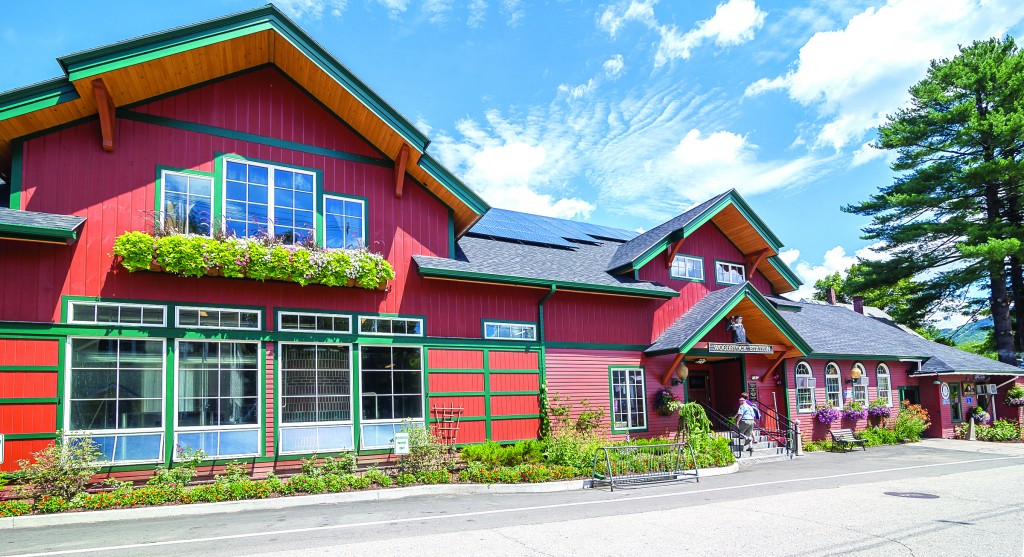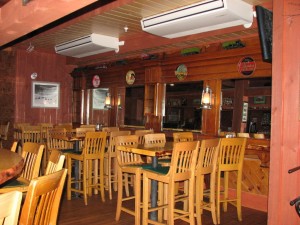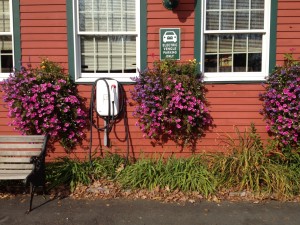The Woodstock Inn Station & Brewery

The Woodstock Inn, Station & Brewery at 135 Main St., No. Woodstock, NH, has achieved a level of energy efficiency that sets the standard for all businesses to follow. The resulting energy savings:$28,000.
By N. R. Mallery
This $2.3 million dollar, 13,000 square foot energy efficiency achievement is an impressive business effort! Has owner, Scott Rice left any stones unturned? The extreme collaboration and actual magnitude of this project at the Woodstock Inn Station & Brewery is going to be a tough act for any business to follow!
Already the largest employer in Woodstock, New Hampshire, with 100 employees in season, the two-year project has allowed owner Scott Rice to open a new function room and move his successful brewing operation in-house while creating 12 to 15 new jobs. The achievements will result in annual energy savings of $28,000.

The Woodstock Inn, Station & Brewery’s annual projected energy savings from the hybrid heat pumps is $12,635. Seely Heating, Plumbing & A.C, from Meredith, NH, installed the Heat Pump system.
The New Hampshire Electric Cooperative (NHEC) “has been an indispensable partner in planning for our electric needs,” Rice said. “They spent a lot of time and effort working with me on my renewable and energy saving options for the new construction, and also on improving our current facility for electricity and fossil fuel usage.”
With care to preserve the appearance of the town’s Main Street, NHEC relocated a three-phase electric service entrance to increase reliability. That enabled a series of energy efficiency improvements, including an ozone cleaning system in the Inn’s laundry, energy-efficient lighting, four air source heat pumps for heating and cooling, and a solar photovoltaic (PV) system.
“Like the extensive construction plans,” Rice said, “planning the energy infrastructure improvements was well worth the time. “The folks at the NHEC devoted a lot of time going through all sorts of options until we finally came up with a plan that worked for my business.”
Achievements:
1. Building Envelope. Alba Architects, from Woodstock, NH were hired for the building envelope. This company is known for maximizing performance and exceeding efficiency codes, with consideration for a client’s budget and return on investment. With the Woodstock Inn Station & Brewery, the thermal resistance values (r-values) exceeded code by 33% for below-grade walls, by 10% for above-grade walls, and by 22% for roofs. The thermal package included a continuous insulation layer for the entire building envelope. Though recently retired, The Lawton Company, Inc, of Littleton, NH was the contractor.
2. Heating & cooling. Seely Plumbing, Heating & AC, from Meredith, NH, took charge of the heating and cooling. The main systems are hybrids with three EXTREME Sub-Zero Inverter Heat Pumps at 60,000 BTU each, coupled with multi-stage back up furnaces at 120,000 BTU each. Mike Hamlin, an energy specialist for Seely explains, “We don’t necessarily need that much heat, but we needed the CFM capacity for the Heat Pumps. It would be a rare event for them to run at full capacity. The heat pumps should do up to 90% of the heating. Hybrids are a benefit in power outages, when a small stand-by generator can run the furnace with little effort.”
Two Mitsubishi H2i Extreme Sub-Zero heat pumps at 36,000 BTU capacity each, are expected to cover 90% or more of the heating required in the bar area.
The brewery has a Heat Recovery Ventilator (HRV) for the fermentation room. Another energy saving device is the stainless steel heat exchanger where wort from the brew kettle passes by in-coming fresh water for the mash tun, pre-cooling the wort on it’s way to the fermentation tanks.
Hamlin commented on the financial means that the owner of the Inn was able to use and that made this project become a reality, saying, “Scott is very smart. I’m hoping that some of his amazing ‘fortune finding’ will rub off on me.”
3. Solar Photovltaics (PV). Frase Electric & Solar, from Sandwich, NH was chosen to install an 18 kW photovltaic (PV) system on the new addition to the main building. The PV system was installed on the roof above the function room, prep kitchen, upper bar and the brewery. Fifty-four solar panels make up Lincoln/Woodstock’s first solar supported business! The estimated production is in excess of 20,000 kWh annually. The 30-Barrel solar powered brewery is now the largest solar array north of Concord, NH.

The latest addition is for solar hot water collectors, estimated to produce 160 million BTUs per year, reducing propane needs by 1,700 to 1,900 gallons. The system is currently being installed by Revision Energy from Exeter, NH.
4. Electric Vehicle Charging Station. NHEC put together a small pilot program to research potential for an electric vehicle charging stations in NH. The pilot program engaged NHEC commercial members, spread throughout their service territory, who were willing to spend money on the installation of a Level 2 electric vehicle charger. It will gather data until the end of 2014, so that NHEC can determine how to help members with this new technology.
5. Solar Thermal. ReVision Energy LLC of Exeter, NH is currently installing a solar thermal system to supply hot water for the Inn. “We have crews from all three of our shops there (Liberty, Portland, Exeter),” said Daniel Clapp, the NH Branch Manager. “It’s a pretty big solar thermal project. On a commercial scale, in a brewery/restaurant situation, this is far and away the quicker return on investment with solar, with some pretty sweet state and federal rebates still available.”
The system consists of 20 Wagner Euro flat plate collectors, and an American Solar Technics 850 gallon custom-made storage tank. The system preheats water for the propane-fired hot water tanks. This will cover a high annual fraction of the hot water load for both the Inn and the Restaurant. The collectors will produce an estimated 160 million BTUs per year, reducing propane needs by 1,700 to 1,900 gallons.
Incentives include the 30% Fed Tax Credit, NH PUC Commercial Rebate of $11,340, NHEC Utility Rebate of $18,900 and to top it off, they are eligible for a MACRS 5 year bonus Depreciation. “We estimate a 2-3 year return on investment,” said Clapp. “The system will be up and running by December 20th.”
6. The financial opportunities that the Inn and Brewery pursued are:
- The New Equipment and Construction Program provided $3060 for the Inn to install LED lighting, High Performance T8 lighting, and lighting controls in the new addition to the main building. Projected energy savings is 49% or $2,000 annually.
- The Commercial and Industrial Heat Pumps Program provided $25,000 for three Carrier/Bryant central hybrid heat pump systems and two high efficiency Mitsubishi mini split systems. These replace an old propane-fueled, inefficient heat and hot water system, and also provide cooling in the expanded main building. Projected savings from this conversion is $13,900 annually.
- The SmartSTART Program. This on-bill financing program provides a means for commercial & industrial members to have energy efficient technologies installed at their business with no upfront cost. The cost of any improvement(s) is repaid over time on the member’s electric bill, using the savings generated. The Inn installed a condensing boiler connected to inn and restaurant heating zones and a high-efficiency modulating domestic hot water system that supplies hot water for the entire facility. Loans totaled $41,414. Projected savings are 27% or $15,700 annually.
- Commercial Fossil Fuel Program. The Inn completed two projects. In 2011 a high efficiency hot water boiler was installed, replacing an old and inefficient oil fired system in the Deachman House, a building that contains guest rooms and the Inn’s laundry facilities, with an incentive of $5,000. Projected energy savings are 31% or $3,000 annually. An ozone generator, which reduces hot water usage, soap usage and drying time while also eliminating “super bugs,” was installed in 2012 in the Inn’s laundry center with an incentive of $5,498. Projected energy savings are 25% or $4,700 annually.
- Commercial Renewable Energy Program. The Inn received an incentive of $19,250 from the Commercial Renewable Energy Program to install an 18 kW PV system on the new addition to the main building. Fifty-four solar panels make up Lincoln/Woodstock’s first solar supported business! Estimated production is in excess of 20,000 kWh annually.

The latest addition is for solar hot water collectors, estimated to produce 160 million BTUs per year, reducing propane needs by 1,700 to 1,900 gallons. The system is currently being installed by Revision Energy from Exeter, NH.
What’s most amazing is the bottom line cost for this project. Owner, Scott Rice explained why the decision to undertake this project was a no-brainer: “The energy programs that made it all possible were because “25% of the costs were covered by a USDA Rural Development Program (REAP) Grant, 25% from NHEC, 17-18% from the standard state rebates, and 30% of the balance came from the Federal Incentives. $7,500 came from the NH Retail Merchants Association, towards the furnace and hot water upgrades. The balance of the $40,000 was financed the NHEC smart start program at 4% through my electric bill. Only 16-17% of the cost was out of pocket. After the bonus depreciation this year, the finished project will be almost free!”








Leave a Reply